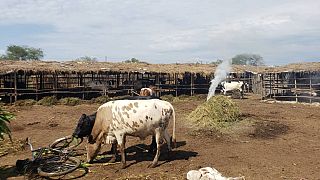Nigeria
Violence between farmers and herders over access to water and land in several Nigerian states has put food production at risk – meaning a hunger crisis is now looming in parts of Africa's most populous nation.
The conflict, which adds to the decade-long insurgency by Islamist extremists who have killed tens of thousands in northeast Nigeria, has resulted in 3,641 deaths from 2016 to 2018, according to an Amnesty International report, the closest to an official tally on the casualties.
Ibrahim Mohammed, who farms yam, soybeans and guinea corn, is one of the farmers caught up in the conflict that's plagued Benue state and parts of northern Nigeria.
He said he had to start from square one after his seedlings, land and home were burned to the ground in 2018.
Life has become a lot more difficult these days, he said, speaking from his farm in Agatu village, northcentral Nigeria, in early January.
As he moved to thresh another heap of rice harvested from the farm, his wife Hannah Mgbede asked to take a break from the back-breaking labour to breastfeed their 18-month-old baby and to have her first meal for the day.
Mohammed, 45, used to harvest as many as ten bags of rice a year from his farm. "This year I can't even see up to three bags," he said, adding that most of this year's profit will go towards paying his labourers.
"Since the time Fulani herders came to attack our village, destroy our farmland and set our crops on fire, we haven't had the money to farm in the same way as we used to," Mohammed said ruefully.
It has been more than three years since the attack on Mohammed's farm and family home, but he is still struggling.
This is common for many farmers, and the consequences, authorities fear, is dealing a heavy blow to Nigeria's overall food production capacity.
Over 70% of Nigerians work in the agriculture sector, mainly at a subsistence level, the U.N.'s Food and Agriculture Organization (FAO) reports.
Benue is one of the states with the largest yields for crops such as rice, yam and soybean, according to government data, earning it the title of 'food basket of the nation.'
But 1.5 million of the state's more than 7 million population – who are predominantly farmers – have been internally displaced in the aftermath of the security crisis, according to Benue's Gov. Samuel Ortom.
"More than 95% of these displaced people are farmers who contribute more than 70% of the total food production in the state," Ortom said, admitting that everything shows "we are heading to a food crisis."
Ortom added that if security is not restored to these farmers then it will be a big challenge to retain the 'food basket' title and continue feeding the population.
Despite its position as Africa's largest crude oil producer, Nigeria is heavily dependent on agriculture, which contributed almost 30% of the nation's gross domestic product in the third quarter of 2021, according to the country's statistics agency.
However, the increasing conflict across northern Nigeria continues to limit the capacity of farmers like Mohammed.
More than 13 million people in the troubled northern region are now facing hunger, according to the World Food Program.
At the Benue camp for internally displaced persons in Guma, some 48 kilometers (30 miles) west of Makurdi, the state capital, many of the 3,000 occupants live from hand to mouth, often relying on support from non-governmental organizations and day jobs at farms.
Farmer Mtonga Iliamgee, 43, is one of them. It's only in the afternoon that she can prepare the first and only meal of the day for her family of 10.
"There's no food here, I have to work for other people as a labourer, for me and my children and my husband to eat," she said. "We keep praying to get work tomorrow so we can get more money to eat."
She said that after the herders destroyed their crops and property, the family came to the camp "with nothing."
Government officials insist they are working to make farmlands safe enough for people to return and work the land.
They're also trying to encourage nomadic herders to take up ranching so they are less at odds with farmers.
Seeds and fertilizers have also been supplied to farmers to enhance food production, cushion the effect of the pandemic and encourage more young people to go into agriculture.











01:06
Brazil launches major security operation ahead of BRICS Summit
11:15
AI drones lead breakthrough against malaria in Africa [Business Africa]
02:18
Netherlands returns 119 artifacts looted from Nigeria
Go to video
Nigerian president orders crackdown on gangs after 150 killed in conflict-hit north
Go to video
Evacuations begin: African citizens caught in Israel-Iran crossfire
02:08
Gunman attack in north-central Nigeria: death toll climbs to 150